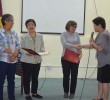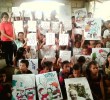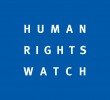Media Release
25 July 2012
PNoy’s Sona overlooks plight of OFWs
DAVAO CITY — A rights-based service center for OFWs here is disappointed over non-mention of President Benigno “Noynoy” Aquino III on the situation of Overseas Filipino Workers (OFWs) and their families in his third State of the Nation Address (Sona).
The Mindanao Migrants Center for Empowering Actions, Inc. (MMCEAI) critiques PNoy’s absentmindedness which failed to discuss the real plight of OFWs and their families, enumerated the major concerns migrant workers are facing today.
Inorisa Sialana-Elento, Executive Director of MMCEAI said, “The latest report of the President showed that the government is neglecting OFWs despite their significant contribution to the country’s economy.”
State of Abandoned Women and Families of OFWs
Elento said that abandonment cases of OFW partners to their spouses is very alarming yet the government has not proposed specific protection mechanism.
MMCEAI alone has recorded 35 cases of abandonment from January 2009 to June 2012 which affects 150 individuals mainly composed of children and grandparents.
“Distressed wives and their children have no one to turn to in case their partners abandoned them. Not one provision in the Philippine Constitution explicitly warrants support and protection for the women and families abandoned by OFWs. The incapability of Philippine courts in pursuing complaints to respondents outside the country thereby sparing abandonee from facing charges intensifies the anguish,” Elento said.
Social cost of migration to Anak OFW
Self-journey sessions conducted by MMCEAI in its 10 partner communities revealed several alarming predicaments besetting Anak OFW (children of migrant workers).
“Children of OFWs vulnerably shoulder the burden of migration. Though there are caretakers like their aunts, uncles or grandparents, children left behind still suffer troubles. Our data shows that OFW children encounters high rate of school drop outs, teenage pregnancies, alcohol or substance abuse and even sexual harassments,” Elento said.
According to Ibon Foundation, a research institution, the physical separation of spouses from each other or of parents from their children resulted to severe challenges. Spouses face the hazards of strained relationships, loneliness and depression and eventually affects the children, it added.
The government, Elento added, should design a program that would address issues confronting youth and children brought by labor migration especially the abandoned ones.
She further stressed, “Another program that would showcase Anak OFW talents and skills is also greatly helpful in yielding behavioral change and increasing their resiliency against ill effects of migration.”
Plight of IDP women and children caught in conflicts and disasters
The Research on Women and Conflict: Trafficking in Internally Displaced People (IDP) Camps in Mindanao conducted and published by MMCEAI in 2011 showed that displacements, particularly those caused by armed conflicts and calamities, create conditions that push women and children vulnerable to exploitation and migration.
The study is conducted in key areas of Cotabato City, Maguindanao and and Lanao del Norte.
“Women and children become highly vulnerable to trafficking and illegal recruitment during these crises. The need to provide food on the table and habitable living spaces for families pushes them to opt for illegal recruiters just to work abroad, even if they will carry tampered documents,” Elento said.
The Research recommends long term and short term solutions; and responsive and preventive measures to put a stop to alarming incidents of trafficking and illegal recruitment in Central Mindanao.
“Still, the conduct of extensive education among the evacuees in their temporary shelters about trafficking, illegal recruitment, migration and how recruiters operate is still the basic approach,” she said.
Elento added that the government must establish a program or a structural setup that would monitor incidents of trafficking and illegal recruitment inside the evacuation camps; government must review the performance of all recruitment agencies and punish the erring ones; and provide women some livelihood assistance to shield them from repeated temptation by illegal recruiters.
Other issues and concerns of OFWs
MMCEAI further appeals the government to heed the predicaments of OFWs — access to resources on reintegration program, OWWA’s specific program for OFW families, comprehensive Health Fund, numerous government-imposed pre and post departure fees and abuses of employers and recruitment agencies.
PNoy’s P2-billion National Reintegration Program Fund for OFWs lacked information dissemination particularly in remote communities where majority of migrant workers came from, thus only few of them avail the loan package.
Returned migrant workers should have a full access to resources, Elento said, citing that the voluminous documentary requirement for the processing of loan applications make it more inaccessible for them.
“We all know that these loan packages came from their contributions. So, why give them a very hard time to avail?,” she added.
Moreover, MMCEAI is hopeful that Overseas Workers Welfare Administration, aside from direct services to OFWs, will have a specific program for families left behind by OFWs citing cases of distressed OFW families.
The absence of comprehensive Health Fund for OFWs is also unsupportive to the plight of OFWs.
“There are distressed cases of OFWs like suffering from cancer or other fatal diseases; and those who accidentally fell on site, experienced inaccessibility of medical assistance despite PhilHealth membership,” she added.
Further, MMCEAI also criticizes the numerous government-imposed pre-departure and post-departure fees that include mandatory Pag-ibig contributions, Philhealth premium cost, affidavit of support fees and many others.
“The worst part here is that all those government-imposed fees had increased. Today, they are paying P1,200 as annual payment for Philhealth. Bad news for OFWs because in 2013, the new rate of P2,400 per year will take effect,” Elento stressed.
“The voluminous fees is plunging OFWs to more debts,” she said.
Elento also mentioned the July 19 protest of 180 OFWs in Riyadh, Saudi Arabia who suffered abuses from their employers and recruitment agencies.
OFWs from companies of Al-Swayeh, Al-Zahran, Al-Naseeb and Al-Sabillah complained of illegal recruitment, contract violation, overcharging of placement fees, contract substitution, poor working accommodations, illegal salary deductions, non-payment of salaries and many others.
Licensed recruitment agencies involved in contract violation, abuse and exploitation are Saveway International Man Power, Osims Oriental Skills International Manpower, RPF Business Management & Consultancy Inc, Irsal Employment Services Inc., GBMLT Manpower Services Inc., Nawras Manpower Services Inc., Al Assal Manpower Inc., Matawi and 4 Brothers.
Elento emphasized that there is no reason for the government to overlook these issues and concerns of migrant workers, the fact that they are always bragged as the “savior of the country’s economy.”
“To migrate and work overseas is a right of every Filipino. But this right should not be abused and exploited. It is still the responsibility of the government to recognize, respect and give migrant workers the full protection and security including their families,” she said.
Elento added that the remarkable increase of Filipinos seeking employment abroad is a signal for the government to generate jobs in the country.
At least 4,500 OFWs leave the country everyday through the Philippine Overseas Employment Administration, Elento said, excluded in the figure those who leave the country through irregular channels.
The International Organization of Migrants (IOM) places the Philippines as the fourth leading migrant-sending country in the whole world, next only to China, Mexico and India.










